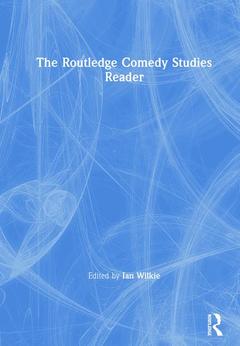The Routledge Comedy Studies Reader
Coordonnateur : Wilkie Ian

The Routledge Comedy Studies Reader is a selection of the most outstanding critical analysis featured in the journal Comedy Studies in the decade since its inception in 2010.
The Reader illustrates the multiple perspectives that are available when analysing comedy. Wilkie?s selections present an array of critical approaches from interdisciplinary scholars, all of whom evaluate comedy from different angles and adopt a range of writing styles to explore the phenomenon. Divided into eight unique parts, the Reader offers both breadth and depth with its wide range of interdisciplinary articles and international perspectives.
Of interest to students, scholars, and lovers of comedy alike, The Routledge Comedy Studies Reader offers a contemporary sample of general analyses of comedy as a mode, form, and genre.
Foreword by Ian Wilkie
Acknowledgements
Part I: Back to Basics: What is Comedy and Where Does It Come From?
1. Against Comedy Chris Ritchie
2. Thoughts on the current state of humour theory Peter Marteinson
3. The origins of comic performance in adult–child interaction Ian Wilkie and Matthew Saxton
4. The science of baby laughter Caspar Addyman and Ishbel Addyman
Part II: Old Comedy: Taproots and Tropes
5. The time-travelling miser: Translation and transformation in European comedy Rachel Kirk
6. Conflict and slapstick in Commedia dell’Arte – The double act of Pantalone and Arlecchino Louise Peacock
7. Clowns do ethnography: an experiment in long-distance comic failure Barnaby King and Richard Talbot
Part III: Class, Gender, Race: Reading Comedy’s Issues
8. ‘To what base uses we may return, Horatio!’ – Hamlet, Comedy and Class Struggle Isaac Hui
9. No other excuse: Race, class and gender in British Music Hall comedic performance 1914–1949 David Huxley and David James
10. 'Women Like Us?' Gilli Bush-Bailey
Part IV: Doing Comedy: Giving, Receiving, Causes and Effects
11. Pretty funny: Manifesting a normatively sexy female comic body Hannah Ballou
12. No greater foe? Rethinking emotion and humour, with particular attention to the relationship between audience members and stand-up comedians Tim Miles
13. The roots of alternative comedy? – The alternative story of 20th Century Coyote and Eighties Comedy Lloyd Peters
14. Life memory archive translation performance memory archive life: textual self-documentation in stand-up comedy Christopher Molineux
Part V: New Comedy? Interviews with Practitioners
15. Not the definitive version: an interview with Ross Noble Oliver Double
16.Scenes in the House of Comedy: Interview with Stewart Lee Tony Moon
17. Up and down with Barry Cryer: From an interview conducted on 22 July 2011 Tony Moon
18. Interview with Charlie Hanson Gary Turk
19. ‘Words are my weapons’: Tiffany Stevenson interview Tony Moon
20. Russell Kane: Comic chameleon Sam Friedman
21. Les Dennis: Man out of time Sam Friedman
22. ‘Not a funny place to live’: An interview with Chris Rock Kara Hunt
23. A series of ghastly mistakes that turned out right in the end Tony Moon interview with John Lloyd (comedy producer)
24. Interview with Kate Fox - stand-up poet Ian Wilkie
Part VI: Critical Angles: Essays on a Joan Rivers’ Routine
25. From toothpick legs to dropping vaginas: Gender and sexuality in Joan Rivers’ stand-up comedy performance Sharon Lockyer
26. Joan Rivers – Reading the meaning Louise Peacock
27. ‘A pleasure working with you’: Humour theory and Joan Rivers Brett Mills
Part VII: The World of Comedy: Culture and Satire
28. Obscenity, dirtiness and licence in Jewish comedy Debra Aarons and Marc Mierowsky
29.Satire in a multi-cultural world: a Bakhtinian analysis Grant Julin
30. Silly meets serious: discursive integration and the Stewart/Colbert era Amanda Martin, Brbara K. Kaye and Mark D. Harmon
31. The comedian, the cat, and the activist: the politics of light seriousness and the (un)serious work of contemporary laughter Ian Reilly
32. Borat, Sacha Baron Cohen, and the seriousness of (mock) documentary Cate Blouke
Part VIII: New Comedy? Emerging Platforms and Forms of Expression
33. A book and a movie walk into a bar Kyle Meikle
34. Kidding around: children, comedy, and social media Peter Kunze
35. A new economy of jokes?: #Socialmedia #Comedy Rebecca Krefting and Rebecca Baruc
36. Comedy meets media: how three new media features have influenced changes in the production of stand-up comedy Jillian M. Belanger
37. The animated moving image as political cartoon Lucien Leon
38. Is vlogging the new stand-up? A compare/contrast of traditional and online models of comedic content distribution Matthew McKeague
Index
Ian Wilkie is a Lecturer in Performance at the University of Salford, specialising in the Comedy Writing and Performance degree. His PhD is in Comedy and he is the author of Performing in Comedy: A Student’s Guide. Wilkie has been articles editor of Comedy Studies since 2013 (becoming main editor in 2015), and occasionally works as a comic actor.
Date de parution : 10-2019
17.4x24.6 cm
Date de parution : 10-2019
17.4x24.6 cm
Disponible chez l'éditeur (délai d'approvisionnement : 14 jours).
Prix indicatif 46,39 €
Ajouter au panierThèmes de The Routledge Comedy Studies Reader :
Mots-clés :
Smart Cats; humour; Young Man; laughter; Max Miller; ethnography; Inglourious Basterds; commedia; Public Engagement Agendas; alternative comedy; Occupy Wall Street; stand up; Research Excellence Framework; bakhtin; Vice Versa; stewart lee; Political Animation; chris rock; Contemporary Society; ross noble; Def Comedy Jam; barry cryer; Comedy Studies; russell kane; Female Comic; sketch comedy; Initial Documentation; sitcom; Baby Laughter; Joan Rivers; Cohen’s Performances; funny; Carnival Laughter; farce; Online Content Creators; slapstick; Infant Laughter; screwball; Discursive Integration; satire; Music Hall Commissioner; improvisation; Political Cartoon; physical comedy; Southampton Solent University; jokes; Tv Day; deadpan; Carnival Spirit; one liner; spoof; humour theory; classical comic performance traditions; European comedy; adult–child interaction



